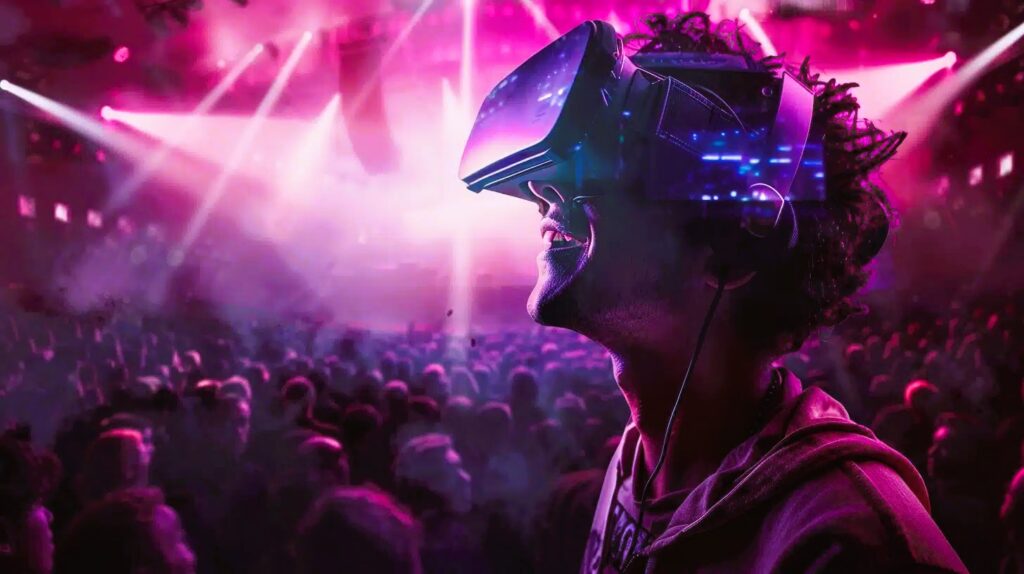As technology continues to evolve, so too does the landscape of entertainment, particularly in the realm of gaming. One of the most exciting developments in recent years is the rise of virtual concerts within video games, blending the lines between interactive experiences and live performances. This phenomenon not only redefines how we consume music but also how we engage with our favorite games and artists. From massive multiplayer online games to virtual reality environments, virtual concerts are paving the way for a new era of entertainment that combines the thrill of live music with the interactivity of gaming.
The Concept of Virtual Concerts
Virtual concerts are live performances that take place in digital environments, allowing players to attend and experience music in ways that traditional concerts cannot offer. These concerts can be held within a game’s universe or through dedicated virtual platforms, providing players with an immersive experience that can include visual effects, interactive elements, and community engagement. With the pandemic pushing many live events online, the gaming industry seized the opportunity to innovate, resulting in groundbreaking concerts that attracted millions of viewers worldwide.
The Appeal of Virtual Concerts
The appeal of virtual concerts lies in their accessibility and interactivity. Players can attend concerts from the comfort of their homes, regardless of their geographic location. This democratization of access enables fans who may not have the means to travel for live events to enjoy performances from their favorite artists. Additionally, virtual concerts often offer unique interactive features, such as the ability to dance, cheer, or even influence the performance in real-time. This level of engagement creates a sense of community among attendees, fostering a shared experience that can be difficult to replicate in physical venues.
Pioneering Examples of Virtual Concerts in Games

Several games have pioneered the concept of virtual concerts, each offering a unique twist on the experience.
1. Fortnite: The Game-Changer
Perhaps the most notable example of a virtual concert is the series of live events hosted within Fortnite. In 2019, the game featured a groundbreaking concert by Travis Scott, titled “Astronomical.” This event attracted over 12 million players concurrently, showcasing an innovative blend of gaming and music. Players were able to navigate the virtual environment, experiencing the concert from various perspectives while engaging with dynamic visual effects and interactive elements. The success of this event set a new standard for virtual concerts, demonstrating the potential for games to host large-scale live performances.
2. Roblox: A Platform for Musical Expression
Roblox has also embraced virtual concerts, allowing users to create and attend live performances within its user-generated world. The platform has hosted concerts featuring artists like Lil Nas X and Bebe Rexha, creating interactive environments where players can dance, socialize, and enjoy music together. Roblox’s flexibility as a platform allows for a wide range of musical genres and styles, making it a popular choice for artists looking to reach younger audiences. Did you like the article? Read also about Music in E-Sports.
3. Guitar Hero: A Musical Journey
While not a traditional virtual concert, the Guitar Hero series has long been synonymous with music gaming. In recent iterations, the series has introduced live performance elements, allowing players to experience concerts as part of the gameplay. This blend of gaming and live music enhances the overall experience, giving players a taste of what it’s like to perform in front of an audience while interacting with their favorite songs.
4. Wave: The Future of Virtual Concerts
Wave is a platform dedicated to creating virtual concerts and experiences featuring artists across various genres. With a focus on interactive environments, Wave allows fans to engage with artists in real-time, often incorporating gaming elements into the performances. The platform has hosted concerts featuring artists like T-Pain and The Chainsmokers, showcasing the potential for collaboration between musicians and game developers to create unique entertainment experiences.
The Technology Behind Virtual Concerts
The success of virtual concerts relies heavily on advancements in technology, including real-time rendering, virtual reality (VR), and augmented reality (AR). These technologies enable developers to create visually stunning environments that enhance the overall experience for attendees.
Real-Time Rendering
Real-time rendering technology allows for the seamless integration of visuals and music during virtual concerts. This technology creates dynamic environments that respond to the music, providing an immersive experience for players. As the performance unfolds, lighting effects, animations, and environmental changes can all be synchronized with the music, creating a spectacle that captivates audiences.
Virtual Reality and Augmented Reality
Virtual reality (VR) and augmented reality (AR) are also playing a significant role in the evolution of virtual concerts. VR technology allows users to step into a fully immersive environment, experiencing concerts as if they were physically present. This level of immersion creates a unique connection between the artist and the audience, allowing for more personal interactions.
On the other hand, AR can enhance live performances by overlaying digital elements onto the real world. This technology enables artists to create hybrid concerts that blend physical and virtual experiences, offering fans a new way to engage with music.
Challenges and Considerations

While virtual concerts present exciting opportunities, they also come with challenges. One significant concern is the potential for technical issues during live performances. Lag, server overloads, and connectivity problems can detract from the experience, leading to frustration for both artists and attendees. Ensuring a smooth experience requires robust infrastructure and planning.
Another consideration is the monetization of virtual concerts. While traditional concerts generate revenue through ticket sales, virtual events often rely on alternative models such as in-game purchases or sponsorships. Finding sustainable revenue streams will be crucial for the continued growth of virtual concerts.
The Future of Virtual Concerts
The future of virtual concerts in gaming looks promising, with increasing collaboration between artists, game developers, and technology companies. As technology continues to advance, we can expect even more innovative experiences that push the boundaries of entertainment.
Moreover, the ongoing integration of music and gaming will likely create new opportunities for artists to reach wider audiences and engage with fans in novel ways. With the potential for cross-platform experiences, virtual concerts could become a standard feature in the gaming landscape, appealing to both music lovers and gamers alike.
Virtual concerts represent a new frontier in entertainment, merging the worlds of gaming and live music in exciting ways. As we continue to explore this innovative medium, it’s clear that the potential for virtual concerts to transform how we experience music is immense. From the groundbreaking performances in Fortnite to the community-driven events in Roblox, these concerts are redefining what it means to engage with music in the digital age.
As artists and developers continue to collaborate, the future of virtual concerts promises to be even more immersive, interactive, and inclusive, making it an exciting time for both gamers and music fans. The evolution of virtual concerts is not just a trend; it is a testament to the limitless possibilities of entertainment in the modern world.
For more information on the evolving landscape of virtual concerts in gaming, you can check out Virtual concert – Wikipedia.

